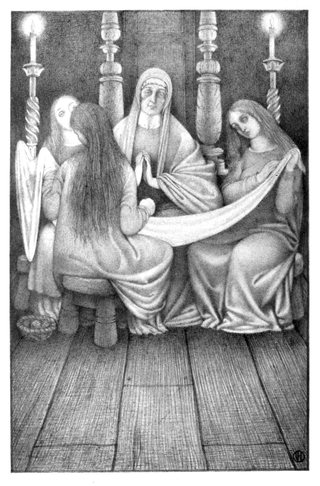Related Research Articles
The Famous Flower of Serving-Men or The Lady Turned Serving-Man is a traditional English language folk song and murder ballad. Child considered it as closely related to the ballad "The Lament of the Border Widow" or "The Border Widow's Lament".
"Unusually, it is possible to give a precise date and authorship to this ballad. It was written by the prolific balladeer, Laurence Price, and published in July 1656, under the title of The famous Flower of Serving-Men. Or, The Lady turn'd Serving-Man. It lasted in the mouths of ordinary people for three hundred years: what a tribute to the work of any writer, leave alone the obscure Laurence Price. Oral tradition, however, has made changes. The original has twenty-eight verses and a fairy-tale ending: “And then for fear of further strife, / he took Sweet William to be his Wife: / The like before was never seen, / A Serving-man to be a Queen”. – Roy Palmer, A Book of British Ballads
Willie's Lady is Child ballad number 6 and Roud #220. The earliest known copy of the ballad is from a recitation transcribed in 1783.
"Hind Etin" is a folk ballad existing in several variants.
Fair Annie is a traditional folk ballad, existing in several variants.

"Lord Thomas and Fair Annet", also known as "Lord Thomas and Fair Eleanor", is an English folk ballad.
The Gay Goshawk is a traditional English-language folk ballad.
Jellon Grame is a murder ballad, listed as Child ballad number 90.
"Rose the Red and White Lily" is Child ballad number 103.
"The Fair Flower of Northumberland" is a folk ballad.

Fause Foodrage is a Scottish murder ballad of the 17th or 18th century. It was first printed by Walter Scott in Minstrelsy of the Scottish Border (1802). Scott cited Elizabeth, Lady Wardlaw as the ballad's probable author.
Lady Elspat is an English-language folk song.
"Gil Brenton" is an English-language folk song, existing in several variants.
Willie and Lady Maisry, also known as William and Lady Marjorie, is an English-language traditional folk song, likely originating in Scotland. In the liner notes to folk musician Joe Rae's recording of this song, Rod Stradling writes that "Joe believes that the ballad is set in the area around Selkirk—possibly at Thirlstane Castle, in Lauderdale, to the north-east of Selkirk."
"Erlinton" is an English-language folk ballad. One variant features Robin Hood, but this variant forces the folk hero into a ballad structure where he does not fit naturally.
"Young Andrew" is a folk song catalogued as Child ballad 48.
The Knight's Ghost is a traditional English-language folk ballad. It tells the story of a woman who learns that her husband has died in battle, after which she locks his men in a cellar and throws the keys in the sea. Her husband's ghost appears to ask that she release his men, assuring her they fought bravely. Francis Child drew the ballad from Buchan's Ballads of the North of Scotland.
Clerk Saunders is an English-language folk song, likely originating somewhere in England or Scotland. It exists in several variants.
Willie's Fatal Visit is an English-language folk song, most likely originating in Scotland.
"Brown Robyn's Confession" is an English-language folk song.
"The King's Dochter Lady Jean", also called "The King's Daughter," "Fair Rosie Ann," or "Queen Jane", is an English-language folk song.
References
- ↑ Francis James Child, English and Scottish Popular Ballads, "The Bent Sae Brown"
- ↑ Francis James Child, The English and Scottish Popular Ballads, v 2, p 170, Dover Publications, New York 1965